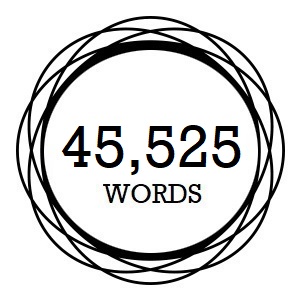45,525
 I wrote a science-fiction screenplay, entitled True Blood, right around the same time that Charlaine Harris would’ve been writing the first book of The Southern Vampire Mysteries – these are the books that, eventually, became the TV series True Blood. (I mention that as nothing more than coincidence – I just found it funny the way two similar things can occur on different sides of the world. I emailed Charlaine about it, and we got to talking, and are now collaborating together on a science-fiction vampire opera featuring zombie gerbils.)
I wrote a science-fiction screenplay, entitled True Blood, right around the same time that Charlaine Harris would’ve been writing the first book of The Southern Vampire Mysteries – these are the books that, eventually, became the TV series True Blood. (I mention that as nothing more than coincidence – I just found it funny the way two similar things can occur on different sides of the world. I emailed Charlaine about it, and we got to talking, and are now collaborating together on a science-fiction vampire opera featuring zombie gerbils.)
I wanted to sub True Blood to a comp a couple of years ago, so I took it out with the intent of revising it, and shearing through all the overwriting that was prevalent in my work back then. What I found (besides the overwriting) was a story that was so appallingly plotted that convenience (or coincidence) drove every event, and/or things were contrived to happen just because they needed to happen.
I was astounded at the level of shittery.
Monday night, I went to the movies with the two guys I usually go to movies with and watched Jurassic World: Fallen Kingdom. For a mindless, bubble-gum action flick where you’re required to check your brain in at the door before you assume your seats, it’s entertaining enough. But the question is, why do you have to? Why do you have to check your brain in at the door?
This is a defense I’ve heard from people: It’s escapism – you’re not meant to examine it too closely. Or, Why are you picking on it? It’s just a movie. It’s funny that people who fit in either category will criticise movies if they’re bad enough – they obviously just have a higher tolerance for stupidity. But they still get offended if the movie is bad enough.
Years ago when we had franchises, the sequels would inevitably (albeit quickly) dumb the franchise out of existence. As the movies went on, they progressively got more action-based and outrageous, losing all connection to the humanity of the character and the realism of the action. Most sequels go that route because the filmmakers are always trying to top the previous movie.
The first Die Hard (1988) is a brilliant action flick that was lauded for the realism behind the attrition, John McClane (Bruce Willis) getting hurt and bleeding and expressing fear and exhaustion and fallibility. In Live Free or Die Hard (the fourth movie in the franchise), though, there’s a chase scene between a truck (driven by McClane) and a fighter jet. McClane later balances on top of the fighter jet as it spins out of control above a construction site; he then leaps to a perpendicular concrete slab and slides down effortlessly as the fighter jet crashes and explodes.
The first Lethal Weapon (1987) is another great action flick, that introduced the manic Martin Riggs (Mel Gibson) and his older, more wary partner, Roger Murtaugh (Danny Glover) and the unlikely friendship they develop as they investigate a case. By the third movie, the two accidentally set off a bomb that detonates an office building, the whole scene played for laughs and contributing nothing to the plot. (Yes, they’re demoted … then reinstated about five minutes later.)
These sequels disconnect from reality – even within the realms of their own universe and the suspension of disbelief that sustains it. They even stop respecting their characters, which become caricatures of what they once were, and what made them interesting and relatable.
Most blockbusters nowadays feel like Hollywood has jumped right into the fifth movie of a series, employing very little genuine character development (or depth), and implementing tons of insane (and often physically unrealistic) action that is made possible through CGI. The plotting is an assortment of disparate dot points from which the action can hang sequentially. Some – particularly the franchises – trade on the pre-existing goodwill of the property to buoy interest, rather than writing a compelling, logical, and causal story that will attract and hold an audience.
I miss those 1980s blockbusters, like Jaws (1975, and considered the origin of the blockbuster), The Empire Strikes Back (1980), Raiders of the Lost Ark (1981), E.T. (1982), Poltergeist (1982), War Games (1983), The Terminator (1984), Back to the Future (1985), Aliens (1986), Predator (1987), and on this list goes.
Sure, these movies aren’t perfect – no story is. But at least the filmmakers tried to make those stories sound within the parameters of the suspension of disbelief that sustained their universes. At least they focused on story primarily, and the special effects and action sequences complemented what was happening, rather than existing because somebody thought something explosive was needed to engage the audience and rouse them from checking social media on their phones. But maybe they’re only checking because what’s happening on the screen doesn’t demand their attention?
Once upon a time, bad movies looked bad.
Now, given the expertise in Hollywood, the cookie-cutter approach, and technology, bad movies sneak in, look good and fool people.
It’s time we all stopped checking our brain in at the door and demanded better.
Last Week’s Lie: Nope. Surprisingly, I didn’t see Malcolm Turnball and Michael McCormack busking.
